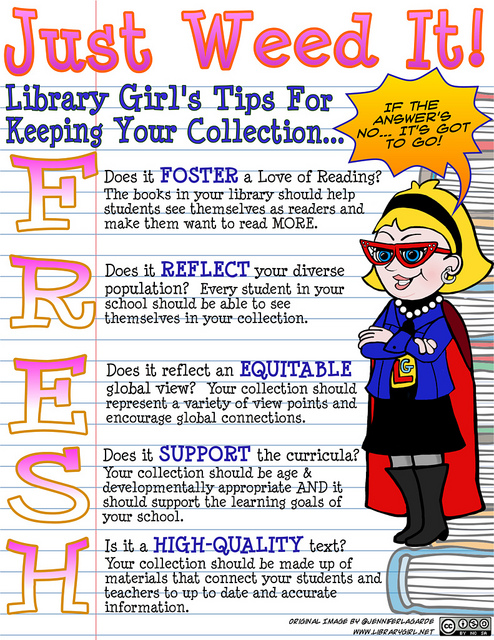What a gloriously uplifting term! What it really means?
Weeding.
Whether you’ve just inherited an old collection, you haven’t had the time to look at your catalog, your administrator or school culture doesn’t like to get rid of books, or you have difficulty making those difficult decisions yourself, you most likely have a collection that needs to be weeded. It’s a struggle that School Librarians face continuously.
As we purchase new materials, we need to consistently weed out old materials. Therefore, we’ll be writing a couple of posts in the next few days that provide information vital to keeping your collection up to date, easy to navigate, and useful for your students.
Today we’re going to start with WHY?
Weeding your school’s library collection is vital for a variety of reasons:
- Weeding helps to keep the information in your collection up to date and relevant.
- Students will be better able to find the books they want or need.
- If you don’t weed, you will eventually run out of space.
- A clean, weeded library shows that the librarian cares about the collection and the patrons who access it.
Yes, we know you already know all of this. But sometimes it’s difficult to put into action, and sometimes it’s even more difficult to convey it to others. So here are some articles you can share when you need to convince someone else.
Weeding to Let My Collection Grow by Christine James (Knowledge Quest, 2017)
Weeding without Worry (American Libraries, 2016)
Keeping Your Library Collection Smelling F.R.E.S.H! (The Adventures of Library Girl, Oct 2013)
From Managing and Analyzing Your Collection: A Practical Guide for Small Libraries and School Media Centers by Carol A. Doll and Pamela Petrick Barron (ala.org, 2002)
Most importantly: Before you dive into a full-blown weeding session, make sure you know your school policy on removing library resources from the collection. We hope these resources are helpful to you.

